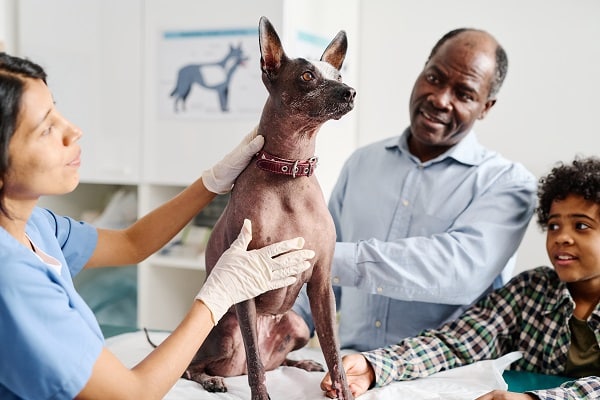Choosing a pet dog is a decision that comes with substantial commitment and responsibility. A dog isn’t just a pet; they quickly become an integral part of your family, and their health plays a significant role in their quality of life and lifespan. Understanding their health needs is essential for potential dog owners, which is the primary focus of this blog. It will explore different health considerations that potential dog owners must keep in mind before welcoming a furry friend into their homes.
Why You Need To Make Health Considerations

When deciding to bring a dog into your life, health considerations should be among your top priorities. Understanding these considerations will help ensure that your future pet has a high quality of life and can stay with you as long as possible. For example, some breeds are prone to certain health conditions that can lead to significant veterinary costs and may cause emotional distress. Ensuring you’re ready to manage these potential issues is a vital step in responsible dog ownership.
Being aware of these health issues beforehand allows prospective dog owners to prepare for these eventualities adequately. It means being able to set aside the necessary resources, knowing when and how to get medical attention, and being emotionally ready for the challenges that might come. Not only does this knowledge improve your ability to care for your pet, but it also helps you choose a breed that matches your lifestyle and capabilities.
Researching Dog Breeds

Before you decide to get a dog, it is crucial to research different breeds thoroughly. Each breed has unique characteristics, including temperaments, exercise needs, and, significantly, specific health concerns. Some breeds are prone to certain hereditary diseases, while others may be generally hardy. This kind of information can guide you towards a breed that aligns with your lifestyle and ability to provide care.
Consider the differences between purebred dogs and mixed breeds as well. Purebred dogs, while often possessing predictable traits, are sometimes more susceptible to certain breed-specific diseases. On the other hand, mixed breeds, often called “mutts,” generally have more genetic diversity, potentially leading to fewer inherited diseases. Understanding these differences is a vital part of the decision-making process when choosing a dog breed.
Understanding A Dog’s Lifespan

The lifespan of a dog can vary significantly based on their breed and size. Smaller dog breeds generally live longer than larger ones, with some small dogs living well into their teens or even early twenties. On the other hand, larger breeds often have shorter lifespans, sometimes only 6-8 years. Knowing this can help you prepare for the commitment you’re making and ensure that you’re ready to care for your pet throughout their life.
Also, lifespan isn’t just about the quantity of years but the quality of those years as well. A breed with a longer lifespan but prone to chronic health issues might require more intensive care in their later years. Conversely, a breed with a shorter lifespan but fewer health problems might be more active and independent for a larger portion of their life. Consider your ability to provide long-term healthcare, including any potential age-related issues, when choosing your dog breed.
Diet And Nutrition Considerations

Nutrition plays a critical role in your dog’s overall health and well-being. Different breeds, sizes, and ages of dogs have varying dietary needs. Small breeds, for instance, often require more calorie-dense food due to their fast metabolism, while large breeds require food that supports their bone and joint health. An inappropriate diet can lead to obesity, malnutrition, and other health issues, so it’s essential to understand your potential pet’s nutritional needs.
Also, some dogs might have allergies or intolerances to certain foods. These allergies can cause a range of problems, from mild discomfort to serious health complications. Knowing about potential food allergies and being prepared to accommodate a special diet if necessary is a key part of responsible pet ownership. Before you choose a dog, consider whether you’re ready and able to provide the proper diet for them.
Exercise And Physical Activity Needs

Physical activity is a cornerstone of good health for dogs, just as it is for humans. Each dog breed has its exercise requirements, from high-energy breeds that need several hours of activity a day to more sedentary breeds that are content with a few short walks. Selecting a breed whose activity level matches your lifestyle is essential for the dog’s health and happiness.
Both under-exercising and over-exercising a dog can lead to health issues. A lack of exercise can result in obesity and associated health problems, while too much can strain a dog’s joints and cause injury. It’s also important to remember that exercise needs can change as a dog ages, with senior dogs typically needing gentler, more frequent exercise to stay healthy.
Mental Health Considerations

When it comes to dogs, people often focus on their physical health, overlooking their mental health. However, mental health is just as crucial for a dog’s overall well-being. Certain breeds may be prone to anxiety, stress, or other behavioral issues, and it’s important to consider whether you can meet their mental health needs.
Mental stimulation is an integral part of keeping your dog mentally healthy. This can include puzzle toys, training, socialization, and simply spending quality time together. A dog that doesn’t receive enough mental stimulation can develop behavioral issues, affecting their happiness and the harmony of your household.
Regular Vet Check-Ups And Vaccinations

Regular veterinary care is a crucial part of maintaining your dog’s health. Regular check-ups can help identify potential health issues before they become severe and provide opportunities for preventive care. Before getting a dog, ensure you’re ready for the commitment of regular vet visits and the costs associated with them.
Vaccinations are a critical part of preventive care for dogs, protecting them from many potentially serious diseases. The vaccination schedule starts when they’re puppies and continues throughout their lives with regular booster shots. Additionally, preventive treatments for issues like fleas, ticks, and heartworm are essential to keep your pet healthy. It’s important to factor in these ongoing healthcare requirements when considering dog ownership.
Potential Genetic Disorders And Health Risks

All dog breeds have a predisposition to certain genetic disorders and health risks. For instance, some breeds are more prone to hip dysplasia, a condition that can severely affect a dog’s mobility. Other breeds might have a high incidence of certain cancers or heart conditions. Knowing these potential health risks can help you understand the long-term care your dog might need and whether you’re equipped to provide it.
Genetic disorders can impact a dog’s quality of life and require ongoing treatment, leading to significant veterinary expenses. Moreover, these conditions can result in emotional distress for both the pet and the owner. Thoroughly understanding these risks and being prepared to manage them is an essential aspect of responsible pet ownership.
Size And Space Considerations

A dog’s size can have a significant impact on their health. Larger dogs, for instance, are often more prone to joint issues and certain types of cancer, while smaller dogs can be more susceptible to dental disease and certain heart conditions. Understanding these health implications can guide you in choosing a dog that fits your living situation and lifestyle well.
Size considerations also extend to the space a dog needs. Large dogs need room to move around comfortably, and a small living space can make this difficult, potentially leading to health and behavior problems. Conversely, while smaller dogs can adapt to smaller spaces, they still need adequate room to play and exercise.
Grooming Needs And Health Implications

Every breed of dog has its specific grooming needs. For some, regular brushing and occasional baths are enough. However, other breeds, particularly those with long or thick coats, require more extensive grooming. Neglecting these needs can lead to health issues, such as skin infections, matting, and overheating.
In addition to coat care, grooming also includes dental care, ear cleaning, and nail trimming. Poor dental hygiene can lead to severe dental disease and other health problems. Regular ear cleaning can prevent infections, and maintaining a dog’s nails at an appropriate length can prevent discomfort and potential injury. The grooming needs of your potential pet are a crucial factor to consider before making your decision.
Understanding The Commitment

Owning a dog is a significant commitment that extends beyond feeding them and providing them with a loving home. It involves meeting their physical, mental, and emotional health needs throughout their lives, and this can be a 10-20 year commitment depending on the breed. Understanding the full extent of this commitment is crucial before choosing to get a dog.
The cost of dog ownership extends beyond the initial purchase or adoption fee, including food, grooming, veterinary care, and potentially pet insurance. Dogs also require your time and attention for exercise, training, and socialization. They become a part of your family, and they depend on you for their well-being. It’s essential to ensure that you’re ready for the joy and responsibilities that come with dog ownership before you take that step.
Make These Health Considerations Before Getting A Dog!
Health considerations are a fundamental aspect of choosing a dog, impacting not just the dog’s quality and length of life but also the experience of owning a dog. By thoroughly understanding these considerations, prospective dog owners can make informed decisions and be better prepared for the responsibility of dog ownership. In turn, this preparation can lead to a rewarding and loving relationship between a dog and their owner. Dog ownership can be a source of immense joy and companionship, but it’s also a responsibility that should not be taken lightly.